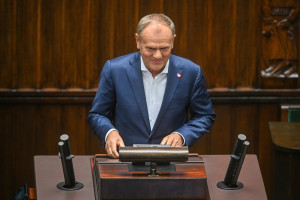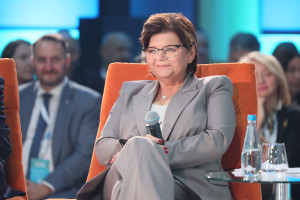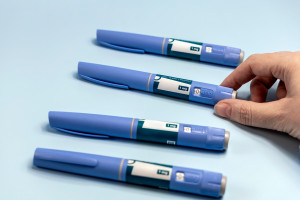Neurologists: Access to MS therapy is very good. Drugs are not the problem

- There are 132 centres in the country treating patients with multiple sclerosis (MS) under the drug programme. The challenge is no longer the availability of drugs, but the organisation of treatment and contracting
- - We have access to almost all therapies in immunomodulatory treatment. We follow what is new in the world - says Prof. Monika Adamczyk-Sowa, president-elect of the Multiple Sclerosis and Neuroimmunology Section of the Polish Neurological Society
- This year, contracts for MS treatment are - so far - lower. This means there may not be enough money to include all new patients in the treatment
- There is practically no center in Poland that would have a contract for 2025 for treatment under the B.29 program, such as in 2024 - analyzed Dr. Jakub Gierczyński from the Institute of Management in Health Care at Lazarski University
- Doctors, representatives of the Ministry of Health and the National Health Fund, and patients discussed the situation of MS patients during the recent (4 June) meeting of the Parliamentary Team for Multiple Sclerosis
Experts admit that the B.29 multiple sclerosis treatment program provides patients with access to a wide range of drugs. Already in the first line of treatment, 11 therapies are available, including highly effective ones. There is a possibility of changes between these therapies at the doctor's request.
Data held by the National Health Fund indicate 25.7 thousand patients treated in 2024. Every year, there are approximately 1.8 thousand more patients with multiple sclerosis (MS) qualified for treatment under the B.29 drug program.
In the opinion of Prof. Monika Adamczyk-Sowa , Head of the Department and Clinic of Neurology in Zabrze at the Silesian Medical University in Katowice, President-elect of the Multiple Sclerosis and Neuroimmunology Section of the Polish Neurological Society, access to modern drugs used in MS in Poland is very good indeed.
- We have access to almost all therapies in immunomodulatory treatment. We follow what is new in the world - said Prof. Monika Adamczyk-Sowa during the recent (4 June) meeting of the Parliamentary Team for Multiple Sclerosis.
There are 132 centers in the country that treat multiple sclerosis under the drug program. The challenge is no longer the availability of drugs, but the organization of treatment and contracting.
- There are centers with varying degrees of load - said the specialist. As she explained, this is because, despite the wide availability of facilities providing MS treatment, patients are more likely to choose those with the most experience. - These centers will certainly significantly exceed the expected contracting, hence the need to adapt it to real needs - she emphasized.
As experts have emphasized, in the case of the B.29 program, we can speak not only of the health effect, but also of the economic and social profit of treating patients. These are most often people with MS diagnosed at the age of 25-30, i.e. of working age. Both pensions and sickness absence in patients with MS - as shown by ZUS data - are on a downward trend. This is the effect of the B.29 program.
- If these young people are treated effectively, they function very well in society - emphasized Dr. Jakub Gierczyński from the Institute of Healthcare Management at Lazarski University.
Contracts for resorts (so far) smaller than a year agoHowever, there are concerns that patients qualified for treatment will wait in queues. Such problems appeared at the end of 2024. Until now, the National Health Fund has allocated more money for the treatment of MS patients from year to year. In 2023, it was PLN 720 million, in 2024 PLN 830 million.
This year, contracts - so far - have turned out to be lower in many centers. As Gierczyński said, extrapolating the data for the entire year, one can draw the conclusion, although this is a simplification, that the overall contracts for MS treatment in 2025 may be lower by 5.2 percent than in 2024. - There is practically no center in Poland that would have a contract for treatment under the B.29 program for 2025 that is the same as in 2024 - he analyzed.
In four provinces, the B.29 program was contracted for only half a year. This is the case in the provinces: Silesia, Mazovia, Pomerania and Łódź.
Iwona Kasprzak , director of the Department of Drug Management at the National Health Fund Headquarters, explained that expenditure on MS treatment under the drug programme has increased significantly in recent years.
As she admitted, the National Health Fund has received signals that in some centres patients qualified for treatment are put in a queue.
She also confirmed that there are several provincial branches where contracts have been set for 6 months of 2025 and that contracts for the second part of the year will be negotiated there.
As she pointed out, the overall budget for drug reimbursement is PLN 1.18 billion higher this year year-on-year and this is not the final amount, because the value of the total reimbursement budget changes several times a year.
- So far, there has not been a year when the directors of provincial branches did not try to pay for all services performed under drug programs - she said. However, the actual possibilities of contracting in drug programs can be determined after the determination of the amount of expenses that the National Health Fund will incur on pay increases for medical personnel from July 1.
Do we need that much monitoring?As reported by Justyna Wilk , Chief Specialist at the Department of Drug Policy and Pharmacy of the Ministry of Health, the B.29 program in 2024 generated the highest costs among all non-oncological drug programs: over PLN 800 million. The ministry expects savings to be generated by introducing molecules to the program that already have or will soon have their generic equivalents.
Prof. Alicja Kalinowska from the Department of Neurochemistry and Neuropathology, Department of Neurology, Karol Marcinkowski University of Medical Sciences in Poznań emphasized that drugs used in MS are very expensive, but at the same time there are few drug programs like B.29, in which treatment translates to such a large extent into patient productivity.
Experts argued that funds allocated to MS treatment could be used more effectively.
According to Prof. Kalinowska, we do not use money or human resources optimally, for example, by requiring patients to have check-ups according to predetermined dates. - I have a comparison, because I also work in the States. A patient who does not need detailed monitoring can come there once a year for a visit - she said. She emphasized, however, that "our drug program is constructed perfectly and patients from the States can only dream of having access to drugs like patients in Poland have."
Prof. Monika Adamczyk-Sowa, speaking about patient check-ups, confirmed that certain groups of drugs do not require monitoring, which was included "rigidly" in the drug program. - This is not only burdensome for the patient, adds unnecessary work for medical personnel, but also exposes the payer to costs - she said.
- We do not have to test the parameters specified in the program for drugs that we know are safe every 3 months, because we have known them for 30 years - she argued. She also pointed to the requirement to administer contrast during magnetic resonance imaging as an example. - There is no need to perform a contrast test every year in every patient who has been stable for many years. This is also unjustified from a medical and economic point of view - she claimed.
Doctors: We can't keep up with reportingSpecialists also spoke about the bureaucracy - in their opinion - of the administrative management of the program. The National Health Fund will not pay for the treatment of a patient when all entries in the SMPT reporting program are not completed on an ongoing basis.
- Sometimes we really can't make it in time. Even though the medicine has been dispensed, the visit is described in the system and there is plenty of evidence that it was carried out correctly, the money is not paid - said Prof. Kalinowska, emphasizing the additional administrative burden on doctors.
As explained by Director Iwona Kasprzak, the completeness of SMPT database data determines the payment for services provided to patients. - We are bound by legal regulations in this respect - she said.
She added that the scope of records in the NFZ registers may change and then they are adjusted by the software provider with a certain delay. - This is taken into account. Then we do not require complete data from the first day of the patient's treatment, but we gradually inform in letters that this data is filled in - she said.
She admitted that the National Health Fund has received comments indicating that the scope of data collected in the SMPT system is extremely broad. - There is indeed a certain dissonance between what clinicians expect and the requirements of the National Health Fund. We are of course open to discussing, limiting administrative activities, simplifying these registers - she assured.
She also said that the discussion about whether consultation and monitoring visits could take place at longer intervals, putting less burden on neurologists, is open.
Justyna Wilk from the Ministry of Health reminded that in 2022, the provisions of the B.29 program abandoned the rigid setting of such visits every 3 months. Currently, the doctor may decide, if the patient is stable, to have another check-up visit after 6 months.
She also said that the Ministry of Health may consider changes to the drug program that could improve qualifications or monitoring. - So far, we have not received such postulates regarding the content of the drug program - she said.
Copyrighted material - reprint rules are specified in the regulations .
rynekzdrowia













